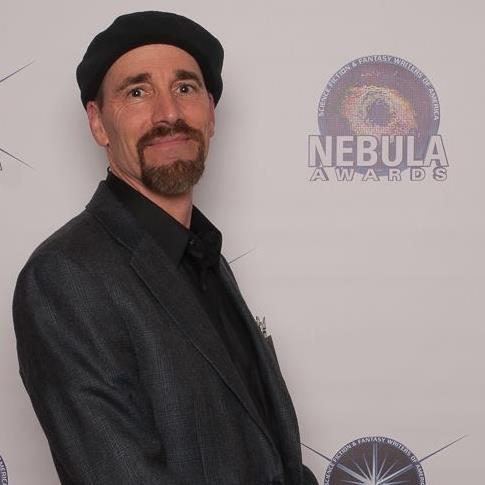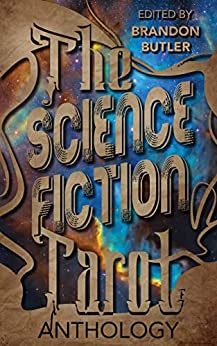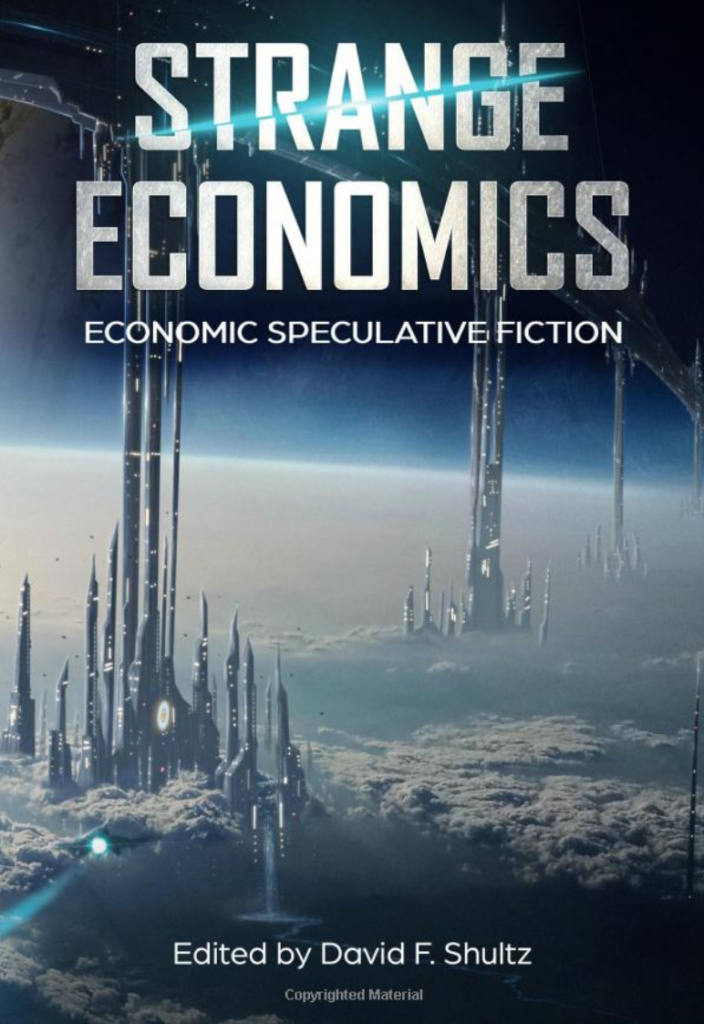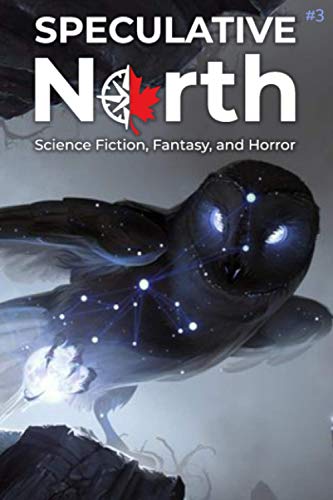In my last post, I hinted I would interview authors whose stories also appear in The Science Fiction Tarot.
Today, I’m pleased to present the first of these interviews.
Karl Dandenell is a first-generation Swedish American, graduate of Viable Paradise XVI, and Full Member of the Science Fiction & Fantasy Writers Association. He lives on an island near San Francisco famous for its Victorian architecture with his family and cat overlords. He is fond of strong tea and distilled spirits.
On with the interview:
Poseidon’s Scribe: When and why did you begin writing fiction?
Karl Dandenell: I remember writing basic stories in grade school, and moved on to SF around middle school. (Yes, I did my own version of Star Trek fanfic.)
My school had several excellent reading programs that allowed you to get extra breaks from class if you committed to read (X) number of pages per month/semester. I might be conflating here, but I recall that in 6th grade the class (or at least the advanced readers) was put on a bus to a book fair in nearby Santa Barbara. One of the authors presenting was Beverly Cleary, and The Mouse and the Motorcycle was one of my favorites. Meeting her was a major event in my life.
As to why I began writing… I think I always wanted to be a storyteller. At least, I wanted people to pay attention to me. Writing seemed a better route than sports. (For the record, I also dabbled in theatre.)
P.S.: Who are some of your influences? What are a few of your favorite books?
K.D.: I read pretty much everything in the local library SF/F section, which didn’t take long. When I started using my Christmas money at the bookstore, I gravitated toward folks like Zelazny, Le Guin, Patricia McKillip, and Jack Vance (all exceptional prose stylists). For Big Idea stories, I’m a big fan of Greg Bear, Larry Niven, Kim Stanley Robinson, and Nancy Kress.
Favorite books: wow, another hard one. Like many writers, there are books that I go back to again and again, the ones that have survived multiple relationships and house moves. There are also books that come into your life at a critical moment and smack you upside the head. A short list would have to include Lord of Light, A Wizard of Earthsea, The Forgotten Beasts of Eld, The Wine of Violence, Emerald Eyes, and In the Garden of Iden.
P.S.: Is there a common attribute that ties your fiction together (genre, character types, settings, themes) or are you a more eclectic author?
K.D.: I write a lot of small cast stories; sometimes it’s just two (main) characters dealing with story’s conflict. My narrators tend to be solitary, or perhaps quiet outsiders. It’s hard for me to write someone like Shakespeare’s John Falstaff. My settings are all over the place. They will, however, always feature food and drink as part of the action. I suspect that started because I would write early in the morning or late at night, especially in grad school, so when I was hungry, my characters tended to eat. So it became a habit.
P.S.: You seem to favor the short story form. Why?
K.D.: Ironically, I find it easier, even though every novelist I know says the short form is harder. For me, the creation of an entire novel is a huge commitment not only to the world but the people, the characters. You’ve got to hang out with these folks for at least a year, and that’s only the draft! With revisions, submissions, re-revisions, etc., you’re looking at multi-year project.
Don’t get me wrong. I love novels. I love a good series. If I ever find myself truly passionate about a theme and cast some engaging characters, I will wade right in. For now, I like to sprint, or at least jog, to the ending. Rejections come a lot faster too, although I’m not sure that’s better. Writers have to develop a thick skin.
P.S.: Your blog has an intriguing title: “Beware of Fire Wombats.” There’s got to be a story behind that. What is it?
K.D.: Oh, yes! You can blame Scott Lynch, an amazing fantasy writer and all-around clever fellow. He was a guest lecturer during my week at Viable Paradise. He was talking about worldbuilding and there was a little digression about the Epic Creation Myth that some writers permit themselves. He tossed out an example of some Ancient War Between Great Powers, like dragons versus fire wombats. Whatever. I loved the image and immediately grabbed that domain (firewombats.com) for my new blog. It’s sort of an unofficial mascot for the VP 16 class.
P.S.: For readers unfamiliar with Viable Paradise, please describe it, and let us know what it was like for you.
K.D.: Viable Paradise bills itself as “a science fiction and fantasy writer’s workshop.” On its most basic level, that’s true, though a better definition might be “genre writers’ grown-up summer camp.” Every year (except during the serious COVID lockdown), twenty-four students and a dozen instructors and “house elves” gather in a hotel on Martha’s Vineyard. In October. It’s off-season, and the hotel is pretty empty. The weather can be lovely, or cold and wet. Not that you see much of the outdoors (at least I didn’t). For five intense days (plus the arrival/departure day), you read, critique, attend lectures, and write. There are also other delightful and challenging diversions that I cannot describe because of the code of secrecy.
What I got during that week was a huge reboot to my writing approach. While I’d had a few professional sales before VP, I lacked a clear understanding of the larger genre writing community and the potential pitfalls of the artistic life. Or the joys, to be honest. Writing is a solitary business, and attending VP introduced me to amazing people, both faculty and students. They were a new tribe, a found family, or perhaps an island of misfit toys. I made some very important friendships, and they have been maintained thanks to the internet and other writing events, like conventions. I honestly think if I hadn’t attended VP I would have struggled for a decade or two to figure out what I wanted.
P.S.: Tell us about your short story, “The Schadenfreuders,” which appears in The Science Fiction Tarot. Something about aliens with strange eating habits, I’ve heard.
K.D.: That was a tough story. I did the initial drafts at a weekend writing workshop in San Antonio but it changed a lot since then. (And was rejected by plenty of markets, honestly.) My idea was to play around with the “alien invasion” trope. I wanted to make it funny, in a dry manner, like classic British humor. What if the aliens came here not because they wanted to enslave us or steal our women, but to eat us? Specifically, they want to eat our suffering. It’s a treat for them. And what if the aliens were just as obnoxious about their gourmet experiences as humans? Well, they’d need someone to act as their intermediary, which gave me my narrator, a poor schmuck of an attorney just trying to make an honest buck. Things don’t go quite the way you’d think.
P.S.: Tell us about your short story, “Supply and Demand Among the Sidhe,” which appears in Strange Economics. Did I hear right? Leprechaun mafia?
K.D.: The title comes from one of my beta readers and her lecture on economic underpinnings in fiction. The working title was “Changeling” since the plot revolved how leprechauns made some extra coin by selling human babies and replacing them with changelings. Eventually, I abandoned that idea and kept the characters, whom I really loved. The story explores the underbelly of capitalism in the land of fae. Specifically, it’s an oligarchy, with all the money flowing upward to Queen Titania. To make any kind of a decent living, all the enchanted creatures had their side gigs. That evolved into organized crime and illicit trade with humans because why not? The main conflict involves a currency shortage, and the queen isn’t putting up with that. Our enterprising leprechaun MC has to ally himself with goblins and sabotage his political rivals (the dwarves) in order to come through the crisis with his skin and bank account intact. It’s very tongue-in-cheek.
P.S.: It seemed you waxed Shakespearean in your tale “Sullied Flesh,” which appears in Speculative North. Tell us about that one.
K.D.: Every writer with an English degree feels the need to do a riff on Shakespeare. The Bard stole from everyone, and I returned the favor. (Full disclosure: I acted a tiny bit in college.) I wanted to use my theatre experience to inform a near-future SF story that is going to be fact sooner rather than later. When I first conceived the plot, it leaned heavily into cyberpunk: what if we would only hire actors to be puppets for famous performances? And what if there were an actor who wanted to prove that he could do Hamlet just like Richard Burton without the brain hardware? That gave me my main character and my conflict.
Some trivia: Hamlet is the most off-quoted Shakespeare play. For my part, I have a wrought iron sculpture in my entryway that spells out, “To thine own self be true.”
P.S.: What is your current work in progress? Would you mind telling us a little about it?
K.D.: I have a lot of WIP stories. It’s a condition. My most recent draft was something I put together during the Nebula Awards conference. It’s a very short piece of secondary world fantasy. In broad strokes, it’s a slightly different POV on the traditional knight vs. dragon trope. Everyone wants to be a hero, but not everyone is cut out for the life.
P.S.: What advice can you offer aspiring writers?
K.D.: Write. Read. Read widely and weirdly. Don’t feel boxed in by classic literature: Shakespeare and Milton and Chaucer are great but they may not call to you. Look to untraditional voices (i.e., woman and writers of color). Travel when you can afford it. Try to make friends with other writers so you can share each other’s pain and celebrate triumphs. Be wary of friends who give you feedback but don’t really say anything. (The same rule applies to family and partners.) Pace yourself: this is a marathon, not a sprint.
And never, ever ignore the Muse. She’s fickle, and appears at the oddest times. If you feel compelled to write something that wasn’t in your plans, then WRITE THE THING. You can always edit later.
P.S.: You’ve traveled through time and met yourself at a point when you were first thinking of being a writer. What one thing do you tell this younger version of you?
K.D.: Similar to what I mentioned above for aspiring writers. For me, I might add that attending an expensive MFA program is more beneficial to job hunting than actual writing. I’d also tell myself to swallow my discomfort, go to those early SF cons, and ask questions. Writers generally love to talk about their work. You can learn a lot more from them than you can from any course.
P.S.: Tell us a little bit about your most recently published story/book.
K.D.: The Science Fiction Tarot! This was my 4th publication associated with the lovely folks in Toronto. (I previously appeared in their “Strange” series: Strange Economics, Strange Wars, and Strange Religion.)
I was attracted to the project’s concept: creating a literary “tarot deck” anthology in which the Major Arcana of the Tarot would represent many of the classic SF tropes (e.g., time travel). As part of the project, the editor planned to commission new artwork for each story. That’s always fun (and pretty rare, unfortunately). It was also a Kickstarter project, which I love to support.
My story, “Schadenfreuders” had been rejected over 40 times before finding a home with TSFT. When the editor reached out, I knew that my story about weird gourmet aliens might be a good match. And it was! At the time I’m writing this, the anthology has only been out in the world a few weeks. I’ve read a few stories and look forward to the rest. And hey, you can get your very copy in gorgeous paper or e-format. Just saying.
P.S.: You’ve won a trip to the fictional world of another author. Where will you go and what will you do there?
K.D.: My first impulse is to name one of the big fantasy realms, but I don’t think that would be much of a vacation. I like indoor plumbing. If I were to stretch the definition of “fictional” to include “imagined future,” then I would love to go to the Mars created by Kim Stanley Robinson, specifically Blue Mars. There would be so much territory to explore.
P.S.: You just met an interested reader in an elevator. The reader asks, “What sort of stories do you write?” The doors will open soon, so what short answer do you give this reader?
K.D.: “I write short fiction, primarily fantasy and speculative fiction. My spec fiction doesn’t require math to appreciate it, and my characters are occasionally snarky.”
Poseidon’s Scribe.: What non-writing hobby or interest do you have? Does it complement your writing or is it a relief from writing?
Karl Dandenell: Does reading count as a hobby? If it does, then it’s both a relief and a complement.
Poseidon’s Scribe: Thank you very much, Karl.
Readers can follow Karl Dandenell on his website and blog, on Twitter, on Facebook, on Goodreads, and on his Amazon page.




